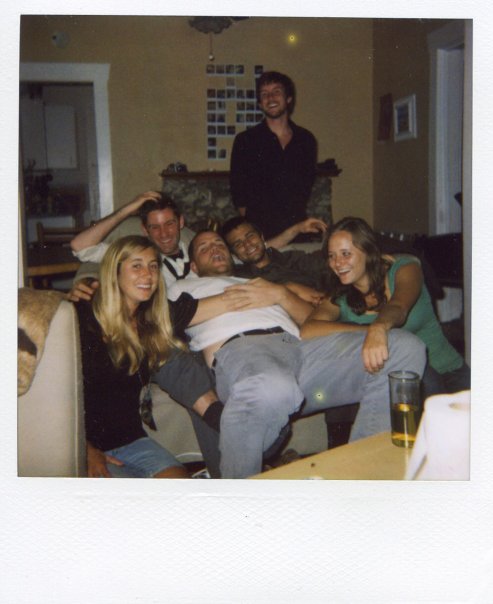New Year’s Eve, 2015, Denver, CO, 11:50 pm: I feel lonely. Though New Year’s Eve is one of the biggest party nights of the year, I was only invited to one small event. I joined J* and A* for dinner, but they dropped me off at my apartment before midnight.
Instead of spending the last moments of 2015 with friends, I’m alone. I have nothing better to do, so, I decide to end 2015 and start 2016 in silent meditation.
When I open my eyes, I make a simple promise to myself: in 2016, I’ll build a great social life. My goal is to have plenty of options for New Years Eve 2016.
***
While you’re in school, making friends is easy. In the real world… not so much. Life often puts thousands of miles between ourselves and the people we love most. I am a perfect example of this – none of my family or close friends from college live in Denver, and only one of my friends from high school lives here. With only one exception, all of my old friends are a plane ride away.
On top of that, life gets cluttered with paying bills, running errands, commuting, building careers, and all the other necessary evils of adult life. It leaves little time for making and deepening new relationships. It becomes easier to heat up a frozen pizza and watch Bojack Horseman than to see if that person you’d like to hangout with wants to grab a beer.
As a result many people feel lonelier than they ever expected they’d be. They find themselves drinking, watching TV, and “staying busy” to distract from the glaring isolation. Heck, I’ve been there.
To further complicate the matter, most people don’t really know how to go about making friends, especially after college. You’d think that after all these years, we’d know how to do it, but many of us don’t. Men especially seem to prefer the pain of isolation to risking the raw vulnerability required for true friendship.
When I say “friend,” I don’t mean someone you call just to shoot the shit with (though that’s important too). What I mean is someone you respect and admire and someone who feels the same way about you. Someone you can open up to and trust. Someone who will help you wipe away the tears when the world rips you apart and celebrate with you when you’re on top of it all.
In this article, we’re going to discuss how to make friends at three different levels. First, we’ll discuss how to find people that you have the potential to click with. Second, you’ll learn how to create communities of people you love. Finally, we’ll talk about how to form deep relationships with a select few.
Along the way, I’ll share tips for overcoming social anxiety, being gentle with yourself, and letting the best parts of yourself shine through.
Part 1: finding and connecting with people you adore

The vast majority of the people on this planet are people you won’t want to be friends with. In fact, finding those you actually like is kind of like mining for gold.
The good news is that you can speed the process up. The trick is to create and attend social events where you’re likely to collide with great people. In most cases, if you enjoy the event, there’s a good chance that it will be filled with people you’ll get along with.
A few ideas to get you started:
- If you work remotely or for yourself, join a coworking space. I’ve met a handful of good friends in coworking spaces.
- Take a multi-week class that interests you (think cooking, dance, improv, acting, sword fighting, etc.).
- Participate in group fitness classes like yoga, CrossFit, spinning, boxing, or a running club.
- Join a rec sports league like Ultimate Frisbee, volleyball, soccer, flag football, bocce, etc.
- Work for a company that hires great people. One of my close friends closed his small business because it was too isolating and joined a startup. He is so much happier.
- Attend meetup groups that interest you.
- Volunteer for a cause or political campaign that matters to you.
- Go to religious or spiritual services that speak to you.
- Join a book, knitting, or game club.
- Start a slow but steady campaign to convince your friends to move to you. I know this idea sounds insane, but I’ve had surprising success… hi S*, hi M* – I’m so glad you’re in Denver!
- Move into a group house – you can find houses looking for roommates on Craigslist as well as other sites and apps. If you take the time to find a house that’s a good fit for you, this can be a fast track to jump-starting or rebooting your social life.
The goal is to hang out with people you are likely to get along with. Of course, just showing up isn’t enough on it’s own. You also have to interact, at least a bit. If you’re shy or introverted (like me), you don’t need to leap out of your comfort zone every time you leave the house.
Instead, start off by consistently showing up. In many cases some of the more outgoing members of the group will come up and start talking to you.
If that doesn’t happen or if you want to be proactive, initiate conversations. I tend to go with, “Hi – I’ve seen you around a few times but don’t think we’ve met – I’m Jason.” After that I’ll generally ask a question related to the context we’ve met in. For example, “How long have you been doing CrossFit?” if we meet at the gym, or “What line of work are you in?” if we meet at a coworking space.
If you’re like most people and have trouble remembering names or details, take quick notes on the people you meet. Scribble down their name, what they look like, and what you guys talked about. If you want to get fancy, write down the important things that are happening in their lives and ask about them next time your paths cross.
Part 2: create a community

With a bit of luck, getting involved in one or more of the activities above will allow you to join an existing community. If so, terrific! You can skip this step. If not, read on.
If you find yourself in the situation of knowing a lot of people but still feeling lonely, it’s almost certainly due to a lack of community.
Almost everyone is longing for community, so forming one tends to be easier than expected. By being proactive, you put yourself in the amazing position of being the linchpin for a group of people you enjoy, which will make your social life explode with activity.
Begin organizing and attending events and inviting the people you’ve met to come with you. A quick text, email, or facebook message a few days before the event, followed by a confirmation a few hours before will do the trick.
If you’re going to host an event on your own and are worried that no one will attend, here’s a trick I lean on all the time. Before you invite the whole group, confirm the event with one or two people who you really like and encourage them to invite people too. This way, in the unlikely event that everyone else declines your invitation, you’ll still have a few people to hang out with.
Here are some of my favorite group activities:
- Organize a lunch where you introduce all of your professional contacts to one another. Bonus points if you put a bit of thought into the guest list and invite people who are likely to get along or do business together.
- Invite your friends to attend a sports game (if your city has a rugby team, go check them out – it’s surprisingly fun and inexpensive).
- Host a dinner party at your apartment. If the idea of cooking for a group intimidates you, try ordering in, asking a friend to help, or making it a potluck.
- Teach something you love. If there is something you love doing – let’s say salsa dancing for example – start teaching other people how to do it. You can do this in a professional capacity by offering lessons or informally by inviting your friends over and teaching them the basics before you all go out dancing.
- If you drink, invite people to a wine, beer, or whiskey tasting. You can find a bar that offers this, or tell everyone to bring their favorite bottle to share with the group.
- Invite friends to happy hour.
- Organize a brunch.
- Go to trivia night.
- Go to karaoke night.
- Host board game nights (lately I’ve been winning big at Settlers of Catan, but getting my ass handed to me at Coup and Ticket to Ride).
- If your town has any quirky or seasonal events happening, organize a group to go check them out (think axe throwing, go karts, cultural festivals, cool exhibits, haunted houses, etc).
Of course, organizing events comes with risk: it’s basically guaranteed that some people will decline your invitation. When this happens, it’s hard not to feel at least a bit rejected. Many people let their fear of rejection prevent them from ever extending an invitation. Bad idea. It’s far better to deal with minor rejection than to be lonely and isolated. Besides, rejection is usually far less personal than it feels.1
Part 3: forming deep relationships

The real goal isn’t just to have people to hang out with; it’s also to find a few people you can form deep relationships with.
For many, true intimacy is both intimidating and elusive. Fortunately, it’s a learnable skill. There are two components here. First, you must allow yourself to be open and vulnerable. Second, you have to create space for people to be open and vulnerable around you.
Component 1: opening yourself up
Most people struggle to open up and be vulnerable around other people. In fact, many people struggle to admit their weaknesses and vulnerabilities even to themselves. And yet, opening up is the only true path towards deep, fulfilling relationships.
Begin by sharing how you’re actually doing in the moment and letting your guard down. Feeling depressed? Secretly afraid that your hard work will amount to nothing? Lonely? Excited because you got a raise? Feeling really powerful and synced up? Let the other person know. Over time, share more and more of yourself. Yes, doing this will usually feel risky. That’s the point.
As you develop intimacy, the goal isn’t to recite facts about yourself while secretly remaining guarded. The goal is to allow all of yourself to be seen, even though it’s pretty much guaranteed that parts of the real you feel messy, complicated, afraid, and unattractive.
Of course, deep relationships can’t just be about you, they also have to be about the other person, too…
Component 2: creating space for the other person to open up
The other part of intimacy is genuinely caring about the other person and making sure they know it. For most, this is often easier said than done.
Fortunately, there are a few tricks to this:
- Stop playing it safe and ask questions that you actually care about. All that complicated and taboo stuff in life like death, sex, politics, drugs, religion, and philosophy? They make amazing conversation topics. Lately I’ve been asking people, “What do you think happens when we die?” and “What’s going on in your spiritual / religious life right now?” When you do this, be generous with your attention and spend more time listening than talking. You should always be willing to answer any question that you ask.
- When someone tells you something that seems important follow-up about it later on. Is your new friend perpetually bothered by her lazy coworker? Ask her how the situation is going next time you see her. Solving her problem, offering insight, or being clever isn’t the point – the point is to let them know you care.
- Remember that true friendship is a gradual process. Intimacy is (usually) created over the course of many encounters with the other person, each leading to a deeper and deeper relationship. You really don’t need to share your greatest insecurities and fears on day one. Instead, pave the way so that on day 1000, you’re filled with appreciation for that person’s role in your life.
- Don’t judge. We are all filled with contradictions, laziness, flaws, traumas, quirks, and other unappealing attributes. If someone opens up to you enough to let you see them, don’t judge her. Doing so will prevent her from opening up in the future. Instead, respond with curiosity, comfort, or compassion and by opening up yourself.
As you start to form deeper and deeper relationships, it’s important to remember one final thing: not everyone is capable of, or willing to, form real relationships. When you meet someone like this, you have a few options. You can maintain a surface level relationship. You can gently let the person go. Or you can love the shit out of them exactly as they are, which – with a bit of luck – may be the exact thing they need to melt the walls around their heart.
Postscript 1: If you’re really struggling…
If you’re really struggling with intimacy or loneliness or just can’t seem to get your social life off the ground, get help. If it’s a matter of needing a few new skills, a bit of encouragement, and some accountability, hire a coach. If you sense that the issue is deeper find a good therapist.
Postscript 2: how I met my girlfriend (or, one year later…)
New Years Eve, 2016, Denver, CO, 11:50 pm: I can’t believe it. Just a few minutes ago there were 30 people in my studio apartment. Now we’re all at dance club about to ring in the new year. This is amazing.
Last year, it was my goal to be able to have better plans for New Years Eve 2016, than I did for New Years Eve 2015. I’ve succeeded beyond my wildest expectations. Instead of just attending someone else’s party, I threw my own. Not only that, but this really amazing woman, L*, came to the party too. Her energy bowled me over. I hope I can get to know her better in 2017…
Footnotes
- Rejection is a complicated thing. To this day, my knee-jerk reaction is to feel as though the person is rejecting me and not the invitation. It’s as though they’re saying, “Man that lunch sounds amazing, but Jason isn’t really cool enough to hang out with so I’d rather not attend.”
Of course, rejection is rarely – if ever – that personal. Though we often catastrophize rejection in our minds, the real reasons for rejection tend to be fairly mundane and impersonal. The person’s busy, large crowds make them anxious, they truly do have an emergency, they’re broke, or whatever.
However, if you notice that you’re consistently getting rejected by many people then it’s time to do a bit of soul searching. Read “How to Win Friends and Influence People,” “The Charisma Myth,” or “A Complaint Free World.” Try some of the stuff those books advocate. And be curious about yourself. Are you doing something that is repelling others? Are you negative? Do you only talk about yourself? Is your social compass a bit miscalibrated? The more curious you are about yourself, and the more open you are to experimenting with new social behaviors, the more quickly you’ll be able to solve these problems.
WOW! What a fantastic article!
Thank you very much Jason for writing this piece.
Your practical advice and your sincerity are both very much appreciated.
My pleasure, David. So glad you liked it, and happy to have you as a reader!